BIOGRAPHY OF MOHD. RAFI
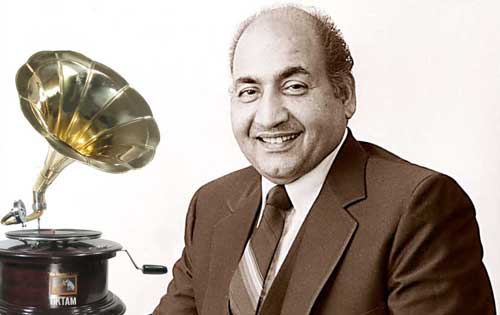
Mohammed Rafi is considered to be one of the greatest playback singers in the history of Bollywood. In the four decades that he was active, he sang for most of the top male actors.
Mohd. Rafi was born on December 24th, 1924 in the small Punjabi village of Kotla Sultan Singh. This is located not far from Amritsar. Rafi's father was named Haji Ali Mohammad, and the young Rafi had five older brothers. As a child, he had the nickname of "Pheeko". Mohd. Rafi started to show an inclination towards music at a very early age when he used to imitate the songs of a wandering fakir that used to visit his village.
In 1935, when Rafi was still but a small lad, his family moved to Lahore. His father had a men's salon, and business opportunities were much better in the city than in the village. This move to the city afforded the young Rafi the ability to pursue his musical He was able to obtain musical instruction from such great musicians as Ustad Bade Ghulam Ali Khan, Ustad Abdul Wahid Khan, Pundit Jiwanlal Matto and Firoze Nizami.
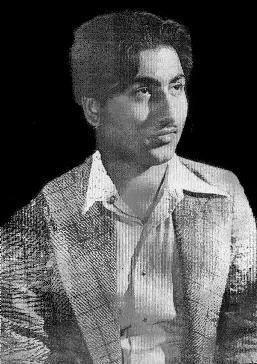
Young Mohd. Rafi
It was fate that initiated Mohammed Rafi's rise to stardom. One time he and his brother Hamid went to attend a performance by the renown K.L. Saigal. Unfortunately the power went off. K.L. Saigal refused to sing without the benefit of the sound system. The audience was getting agitated losing their patience; whereupon Hamid persuaded the organisers to allow Rafi to sing for them until the power was restored. The organisers readily agreed, so he sang for them.
It just so happened that the great composer and music director Shyam Sunder was in the audience. He was very impressed by the young Rafi. Shyam Sundar invited Mohammed Rafi to sing for one of his films. So it was in 1944 at the age of 20, that Rafi sang for his first film. It was the song Soniye Hiriye, Teri Yaad Ne Bahut Sataya, for the Punjabi film "Gul Baloch". This brought Mohd. Rafi to the attention of other music directors.
In 1944, he moved to Bombay to further his career. There he sang for Shyam Sundar in his film "Gaon Ki Gori", and Naushad in his film "Pehele Aap". He very quickly went on to sing for several other music directors, but his first real hit was with Noor Jahan singing Yahaan Badla Wafa Ka in the film "Jugnu" (1947).
His personal life was also developing in this period. In 1945, he married his cousin Bashira. But his personal life was placed under stress in 1947 by the partition. At that point he decided to remain in India; whereupon he shifted his remaining family from Pakistan to India.
Rafi's early forays into Bollywood were not limited just to playback singing, for he also acted in a few films. He acted in "Laila Majnu" (1945) and "Jugnu" (1947).
There is an interesting anecdote concerning Mohd. Rafi and the film "Baiju Bawra". It is said that originally the songs were going to go to Talat Mehmood. However Naushad caught Talat smoking and this annoyed him greatly, whereupon he gave the songs to Mohd. Rafi. These songs became very popular, and are even today considered to be classics. The Naushad / Rafi collaboration turned out to be a very successful one. In all Mohd Rafi sang 149 songs for Naushad.
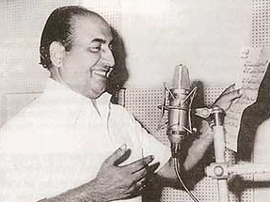
Mohammed Rafi in recording
A major milestone for came in 1949 when Suhani Raat Dhal Chuki, became a great hit. This solidified Mohd. Rafi's position as a top ranking male playback singer. He maintained this position until the 1970's.
The 60's were probably Mohd. Rafi's greatest years. The decade started off with him winning his first Filmfare award for the title song in "Chaudavi Ka Chand" (1960). Throughout the decade he produced many hits with many of Bollywood's top music directors, such as Madan Mohan, Ravi, Laxmikant / Pyarelal, Shankar / Jaikishan and others.
However, the 1970's marked a period of professional decline for him. After the success of "Ardhana", Kishore Kumar arose in popularity and began to take many of the projects that previously would have gone to Rafi. But just as it seemed that Mohd. Rafi was slipping from the scene, he made a remarkable comeback with the success of "Hum Kisi Se Kam Nahi", in which his hit Kya Hua Tera Waada, won him the National Award.
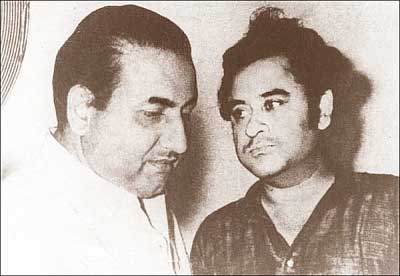
Mohd. Rafi and Kishore Kumar
Bollywood is known for its professional conflicts, and Mohd. Rafi was no exception. His most publicised conflict was in the 60's and 70's with Lata Mangeshkar. There were many instances where this was evident, so no one particular event seemed to have trigger it. It appears that Lata's tendency to exercise her influence over the industry in a heavy handed way, just rubbed many people the wrong way; Mohd Rafi was one of them. The result was that for decades they refused to sing with each other. Although on a professional level this was resolved, and they did sing duets together; on a personal level it apparently was never resolved.
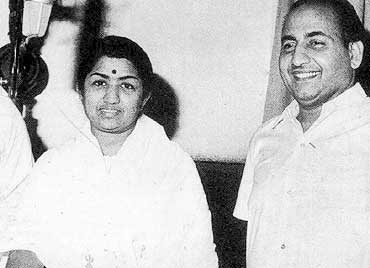
Lata Mangeshkar and Mohd. Rafi
But his successful comeback was not to last forever. In 1980 at the age of 55, Mohd. Rafi died of a heart attack. He was buried on a rainy day in Bombay. His funeral procession is said to have had over 10,000 people.
In his career he won many honours. In 1948 on the first anniversary of Indian Independence, he was awarded a Silver Medal by Jawaharlal Nehru. In 1965 he was awarded the Padma Shri by the Government of India. Finally in 2001 Stardust Magazine awarded him the "Best Singer of the Millennium".
Selected Video
© 1998 - 2021 David and Chandrakantha Courtney
For comments, corrections, and suggestions, kindly contact David Courtney at david@chandrakantha.com
